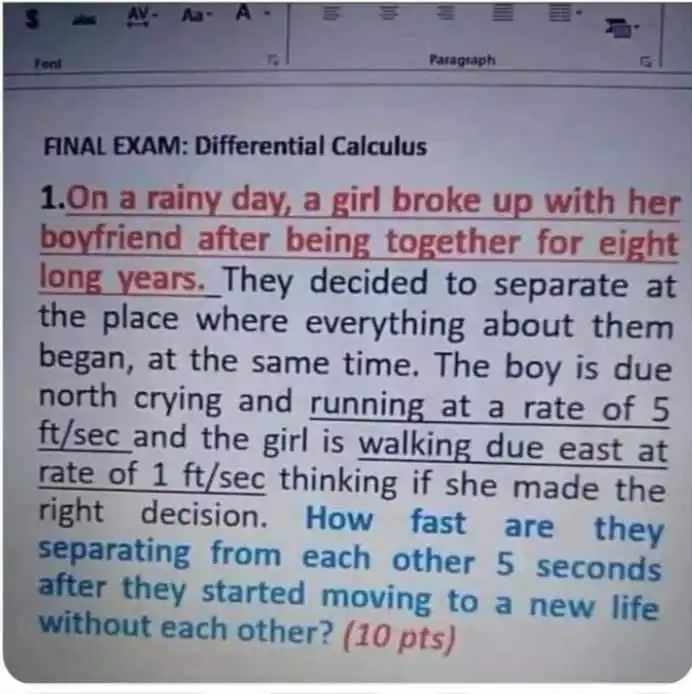Physics rule
Physics rule


Physics rule


You're viewing a single thread.
9,14 Meter
The question states "how fast", not "how far", thus you need to give the acceleration at that moment.
At t=0, the boy and girl both haven't moved, so their positions are 0. The distance between them is also 0, as is their acceleration.
The boy's distance in meters is t1.524, the girl's distance is t0.3048. The distance between them is sqrt( b2 \* g2 ). The velocity is the current distance minus the previous distance.
At t=1, b=1.524m, g=0.305, d=sqrt( g2 \* g2 )=0.465, v=d-d^(t-1)=0.465m/s.
At t=5, b=7.62, g=1.524, d=11.613, and v=4.181m/s.
Edit: fixed markdown
Velocity is not the difference between distances.
It’s the difference of distances apart over time. Aka how fast bf is moving away from gf, aka what the question is asking for.
Yes, if you want to be pedantic, velocity a vector with direction, so I guess you’d have to frame the question relative to either the boyfriend or girlfriend, but I don’t think the difference between speed and velocity is part of the question.
Speed is just the magnitude of velocity.
My point is that OC was completely missing the mark by not properly accounting for time.
Hi, I made this in 5 mins because I was bored, but it's late and I'm tired, so could you please explain what I would have to fix in my comment?
You want to figure out distance per second. One way to do this is calculate distance apart at t=0,1,2…
The difference between each point would be the average speed over that second.
Using sqrt(b2+g2):
t0 = 0
t1 = 1.554m
s1 = (1.554m-0m)/1s = 1.554m/s
t2 = 3.108m
s2=(3.108m-1.554m)= 1.554m/s
As you continue this you will see they travel at a constant speed apart from each other. The reason this is working is because you need to divide distance by time. Dividing by 1 second won’t change the value of the number after you subtract. If you notice you can do (t2-t0)/2s and also get the same answer.
Ahhh okay, thanks
My mistake, I didn’t check his math. I thought he was saying if you take distance apart at t(n) and subtract distance apart at t(n-1) you will get distance/sec.
Only if you divide by time. Including units is an essential sanity check.
Also, the rest of the math needs to be correct.
Well that’s my point. The answer is correct in this specific case, because it’s already “built-in” so to speak.
No, their answer is wrong.
I’m talking about my previous response. I already said their answer is wrong.